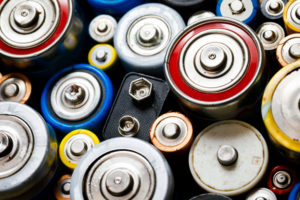Like greasy pizza boxes and plastic bags, batteries are one of those common objects that you have to think twice about before trashing. Do they belong in the recycling bin? The garbage can? Or should they be handed off to your municipal recycling program? Many battery types can’t be recycled, but some can. Proper battery recycling is critical for keeping hazardous materials out of landfills and minimizing the need to mine for new metals and produce new chemicals. There’s a legal component too. Federal and state laws dictate how certain batteries can be disposed of, so it’s important to understand your obligations here.
Legal Battery Recycling Requirements
 The Mercury-Containing and Rechargeable Battery Management Act of 1996, also known as the Battery Act, regulated how batteries made of potentially hazardous materials can be disposed of. Under EPA regulations, nickel cadmium (used to make many rechargeable batteries) and lead (used to make many car batteries) are two of the battery types that are considered universal waste, meaning their disposal has to be managed. Essentially, these battery types can’t legally be thrown in the trash.
The Mercury-Containing and Rechargeable Battery Management Act of 1996, also known as the Battery Act, regulated how batteries made of potentially hazardous materials can be disposed of. Under EPA regulations, nickel cadmium (used to make many rechargeable batteries) and lead (used to make many car batteries) are two of the battery types that are considered universal waste, meaning their disposal has to be managed. Essentially, these battery types can’t legally be thrown in the trash.
In some states, additional battery recycling laws apply. In states including New York, Connecticut and New Jersey, for example, state laws dictate specifically how rechargeable batteries should be managed. Massachusetts currently has no such law, but federal battery recycling laws apply.
Battery Recycling By Type
Dozens of types of batteries exist for different purposes. A bag of mixed batteries may consist of several different types that can’t be disposed of in the same way. The average business will probably handle some of these common kinds of batteries.
- Non-rechargeable: These include your basic household batteries (A, AA, C, D, etc.), which are generally alkaline. This category includes many button cells, small disc-shaped batteries that may contain mercury and are used in many electronics. Some non-rechargeable batteries are also made of lithium, as opposed to lithium-ion batteries, which are rechargeable. These batteries aren’t widely recycled and may be tossed in the trash, depending on local regulations, though recycling services may also accept them.
- Rechargeable: Rechargeable batteries are found in cell phones, laptops and other electronic devices that can be plugged into a power source and charged. These batteries can be made of many different materials that are potentially hazardous to the environment and/or human health. Luckily, they’re easy to identify because they should be clearly marked as rechargeable. Even if you’re not required by law to recycle a certain type of rechargeable battery, these should never be thrown in the trash.
- Industrial: Businesses involved in manufacturing or that own their own heavy equipment may occasionally have to dispose of large, sealed lead acid batteries. They must be recycled.
- Car: Again, car batteries can’t be thrown in the trash. Car batteries are composed of both metal and plastic components, which need to be separated and recycled separately. They may be sealed lead acid, though electric cars generally have lithium-ion batteries.
How to Find Battery Recycling
Municipal recycling programs generally have information about local battery recycling guidelines on their websites. Your local recycling center may accept batteries as routine drop-offs, or you may have to wait for a dedicated hazardous waste day. If your state has laws about rechargeable batteries, there may be dedicated drop-off points for these materials. In any case, Call2Recycle—a nationwide battery recycling program—has information about battery recycling locations around the country.
Many grocery, home improvement and automotive stores also accept certain types of batteries. Grocery stores often have collection bins for small quantities of recyclable batteries, and may even accept industrial batteries too.
Auto batteries can be returned to dealers who sell them, and recycling services may also accept them. Because these batteries include materials (such as lead and plastic) that can be easily recycled and sold to manufacturers, you may even get paid a small amount for a used car battery. Recycling electric car batteries is a different story, though; though these lithium-ion batteries technically can be recycled, they rarely are. These batteries should always be returned to the dealer or manufacturer.
All that said, services that accept old batteries may have different rules for businesses than for households. If you have more than 500 pounds of batteries to recycle, Call2Recycle accepts bulk shipments. Your municipal recycling service should also have resources for businesses.
We want to make sure our community is informed about best practices when it comes recycling. Contact Miller Recycling today for assistance and guidance on proper and safe battery recycling.

